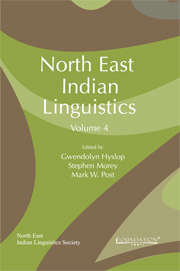5 - Serialized Verbs in Boro
from Bodo-Garo Grammar
Published online by Cambridge University Press: 05 May 2013
Summary
Introduction
Most Tibeto-Burman languages have clause-chaining discourse structure (DeLancey 1991), where several clauses are chained together in a sequence with only one finite verb. Lhasa Tibetan (DeLancey 1991) and Lahu (Matisoff 2003) are examples of Tibeto-Burman languages with clause-chaining discourse structure. It has been well attested that clause-chaining discourse structure facilitates serial verb constructions, which, in turn, facilitates the development of grammaticalized verbs in such languages. In this process, grammaticalized verbs may even further develop into prefixes or suffixes. (DeLancey 1991). These grammaticalized verbs mostly develop from motion verbs like ‘go’ and ‘come,’ and postural verbs like ‘stand’ and ‘sit’ (Foley and Olson 1985).
Boro, a Tibeto-Burman language, has both a clause-chaining discourse structure and a serial verb construction. We will talk about these two constructions in detail below. The focus of this paper is a small set of verbs which can occur in the serial verb construction. Some of these verbs have developed a fair amount of grammatical meaning, while others still retain their lexical meaning. Some of them have undergone vowel change too. However, they are still identifiable with their non-serialized main verb counterparts. We will call these verbs ‘serialized verbs’ rather than grammaticalized verbs for obvious reasons. The paper has the following structure: §2 gives a brief background on the Boro language in general, and the dialect on which this work is based in particular.
- Type
- Chapter
- Information
- North East Indian Linguistics , pp. 83 - 103Publisher: Foundation BooksPrint publication year: 2012
- 3
- Cited by



